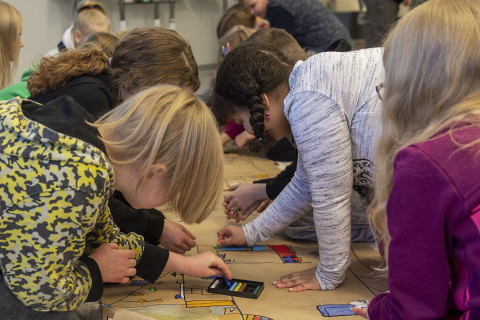The doctoral dissertation in the field of Education will be examined at the Philosophical Faculty. The public examination will be streamed online.
What is the topic of your doctoral research? Why is it important to study the topic?
This dissertation investigates how children engage in intercultural encountering with each other, and how this kind of encountering can be promoted in primary school. In their everyday lives, children have experiences of encountering each other, but this kind of knowledge is rarely drawn upon during intercultural learning experiences in school. When children are able to draw on their prior knowledge and experiences, an intercultural encounter becomes meaningful and builds reciprocity between the participants. Making intercultural encounters a part of everyday life at primary school forms the foundations for lifelong intercultural dialogue and friendship.
What are the key findings or observations of your doctoral research?
The study showed that children use playfulness and narrativity skilfully to connect with each other during an intercultural encounter. The also use their everyday experiences as well as their peer culture.Another aim of the study was to develop learning and teaching which promotes intercultural encountering between children. The study showed that storytelling helped the children to form a connection with their exchange partners. The stories were told using the oral Storycrafting method. It was important that the teacher promoted a participatory climate in the classroom by listening to the children's initiatives and ideas. Developing a communal class culture supported the interaction also between the exchange partners.
How can the results of your doctoral research be utilised in practice?
The research findings include useful new knowledge about theory and best practices, especially for educators and teachers working with children. The study presents a concrete story exchange project, which was shown to support children's intercultural encountering.
The study also produced knowledge about pedagogical practices which promote an inclusive and communal group dynamic in the classroom. It is particularly important to include the children in the development of their own classroom culture.The study also provides future directions for developing school systems. The study's data suggests that certain structures in the school system may hinder intercultural learning that is based on encountering. Therefore, the school system should be developed so that it could also support children's holistic growth and experiential learning, rather than focusing too much on narrow knowledge and skills.
What are the key research methods and materials used in your doctoral research?
A story exchange intervention was implemented over three cycles of design-based research between spring 2015 and spring 2017. During the research cycles, 133 children (aged 9–11) from participating primary school classes in Scotland, Finland and Belgium told stories orally using the Storycrafting method. The children also drew pictures after listening to a partner class’s story. Data production took place ethnographically in the teacher-researcher’s classroom as well as in partner classrooms. In addition to the children’s stories and drawings, other ethnographic data were collected, such as researcher diary entries, teachers’ email correspondence, a teacher interview, and audio-recordings of class discussions. All the data were analysed qualitatively using varied analysis methods in the three sub-studies.
The doctoral dissertation of Oona Piipponen, MA, entitled Children encountering each other through stories: Developing a dynamic approach to interculturality in primary schools, will be examined at the Philosophical Faculty. The opponent in the public examination will be Professor Fred Dervin (University of Helsinki) and the custos will be Professor Ritva Kantelinen (University of Eastern Finland).
